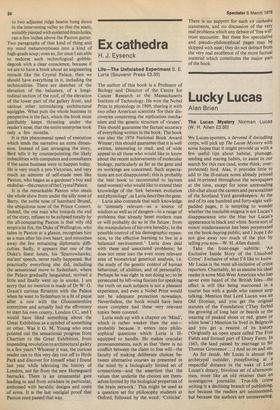Ex cathedra
H. J. Eysenck
Life—The Unfinished Experiment S. E. Luria (Souvenir Press 0.50)
The author of this book is a Professor of Biology and Director of the Centre for Cancer Research at the Massachusetts Institute of Technology. He won the Nobel Prize in physiology in 1969, sharing it with two other American scientists 'for their discoveries concerning the replication mechanism and the genetic structure of viruses'. This should guarantee the factual accuracy of everything written in the book. The book was also the 1974 National Book Award Winner; this should guarantee that it is well written, interesting to read, and of wide appeal to all those who would like to know about the recent achievements of molecular biology, particularly as far as the gene and its workings are concerned. Such expectations are not disappointed; this is probably the best book to recommend to laymen (and women) who would like to extend their knowledge of the 'link between evolution and physiology', as Luria describes the gene.
Luria also contends that such knowledge is 'intensely relevant—as a source of wisdom as well as of dangers—to a range of problems that already beset modern man or will probably do so in the future: from the manipulation of his own heredity, to the possible control of his demographic expansion, to the effective learning to live in a balanced environment.' Luria does deal with these and associated problems; he does not enter into the even more relevant area of biometrical genetical analysis, i.e. the study of the genetic control of human behaviour, of abilities, and of personality. Perhaps he was right in not doing so; to be persecuted by left-wing fascists for speaking the truth on such subjects is not a pleasant experience, and even a Nobel Prize would not be adequate protection nowadays. Nevertheless, the book would have been more complete had these very relevant topics been covered.
Luria ends up with a chapter on 'Mind', which is rather weaker than the rest— probably because it enters into philosophical questions which Luria is illequipped to handle. He makes oracular pronouncements, such as that 'there is no conflict between the claim to free will—the faculty of making deliberate choices between alternative courses as presented in the mind by a biologically limited set of connections—and the assertion that the values that underlie the choices are themselves limited by the biological properties of the brain network.' This might be used as a question set for philosophy students at Oxford, followed by the word: 'Criticise'. There is no support for such ex cathedra statements, and no discussion of the very real problems which any debate of 'free will must encounter. But these few speculative and pseudo-philosophical pages may be skipped with ease; they do not detract from the very real excellence of the more factual material which constitutes the major part of the book.


































 Previous page
Previous page